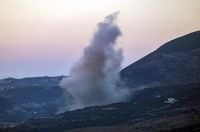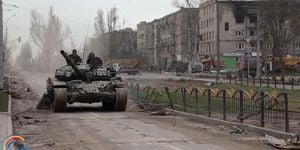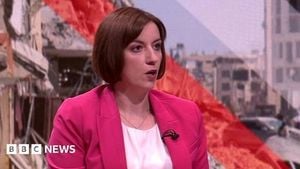Ten months after the highly anticipated ceasefire agreement between Israel and Lebanon was declared in November 2024, the region remains gripped by violence, displacement, and mounting civilian suffering. Despite the truce, the United Nations has verified the deaths of 103 civilians in Lebanon, highlighting the ongoing dangers faced by communities in the country’s south and raising urgent questions about the durability of peace in the area.
According to the UN Human Rights Office, which released its findings on October 1, 2025, the toll of violence since the ceasefire has been severe. The agency confirmed that 103 civilians have lost their lives in Lebanon during this period, with no reported Israeli casualties from projectiles fired from Lebanon. The persistence of hostilities has prompted renewed calls for a comprehensive and lasting resolution to the conflict. As UN human rights chief Volker Türk stated in a recent address, "We continue to witness the horrific impact of airstrikes and drone attacks on residential areas and near UN peacekeeping forces in the south."
Despite the formal agreement to halt hostilities, Israel has maintained near-daily strikes on Lebanese territory, typically justifying its actions as operations targeting Hezbollah operatives or infrastructure. The Iran-backed militant group, Hezbollah, has long been a central player in the region’s instability, and the two months of open warfare preceding the ceasefire only deepened the humanitarian crisis. The UN Human Rights Office emphasized that the violence has not abated for civilians, especially in southern Lebanon, where jet and drone strikes continue to disrupt daily life and threaten lives.
The impact on families and communities has been devastating. Türk described the situation in stark terms: "Families are simply unable to make a start on rebuilding their homes and their lives, and instead are faced by the real and present danger of more strikes." The UN reports that hundreds of schools, health facilities, and places of worship have been damaged or rendered unusable, compounding the region’s humanitarian crisis. Many of these sites are now considered no-go zones, or at best, only partially accessible, making it nearly impossible for normal life to resume.
One particularly tragic incident occurred on September 21, 2025, when an Israeli drone strike in the border area of Bint Jbeil killed five people, including three children. The UN Human Rights Office has demanded an independent and impartial investigation into this strike and others, raising concerns about compliance with international humanitarian law. Türk was unequivocal in his call for accountability: "At all times during the conduct of hostilities, civilians and civilian infrastructure must be protected and international humanitarian law fully respected, irrespective of claims of breaches of a ceasefire."
The violence has not only claimed lives but also displaced tens of thousands. More than 80,000 people remain displaced within Lebanon, unable to return to their homes due to the ongoing insecurity. The crisis has also spilled across the border, with around 30,000 people from northern Israel reportedly still displaced. The scale of displacement underscores the far-reaching consequences of the conflict, which has upended lives and left entire communities in limbo.
The Lebanese Health Ministry reported yet another deadly incident on October 1, 2025, when an Israeli strike on southern Lebanon killed one person and wounded five others. While the ministry did not specify whether the casualties were civilians, the incident added to the growing list of attacks that have kept the region on edge. The UN has repeatedly highlighted the dangers posed by continued military operations, noting that villages in South Lebanon, the Beqaa valley, Hermel, and Baalbek have all been targeted, further violating the terms of the ceasefire and encroaching on Lebanon’s sovereignty.
The ongoing violence has also hampered efforts to restore order and security in southern Lebanon. As part of the ceasefire agreement, the Lebanese Army was supposed to assume control of security in the south. However, persistent Israeli operations have prevented the army from fully deploying in the area, according to a recent UN report. This has left a security vacuum that further endangers civilians and complicates the already difficult task of rebuilding shattered communities.
For many Lebanese, the hope that the ceasefire would bring about a return to normalcy has faded. The destruction of critical infrastructure, the threat of renewed strikes, and the inability to safely return home have left tens of thousands in a state of ongoing uncertainty. The UN Human Rights Office has made it clear that the protection of civilians and civilian infrastructure must be a priority, and that all parties to the conflict must respect international humanitarian law, regardless of any perceived breaches of the ceasefire.
In his statement, Türk stressed the importance of good faith implementation of the ceasefire as the only viable path toward a durable peace. "Good faith implementation of the ceasefire is the only path towards a durable peace, and its terms need to be respected," he said. The call for renewed diplomatic efforts comes amid a climate of deep mistrust, where each new attack threatens to unravel the fragile truce and plunge the region back into open conflict.
The international community has watched the situation in Lebanon with growing concern. The ongoing hostilities not only threaten the stability of Lebanon and Israel but also risk drawing in regional actors and escalating tensions more broadly. The humanitarian cost is already staggering, and without a concerted push for peace, the suffering is likely to continue.
As the ceasefire’s anniversary approaches, the UN’s findings serve as a sobering reminder that the absence of full-scale war does not equate to peace. The continued deaths, displacement, and destruction in Lebanon underscore the urgent need for a genuine and lasting resolution—one that prioritizes the safety and dignity of civilians above all else.




